高中英语高考二轮专题复习:动词时态、语态和情态动词复习课件(30张ppt)
文档属性
| 名称 | 高中英语高考二轮专题复习:动词时态、语态和情态动词复习课件(30张ppt) | 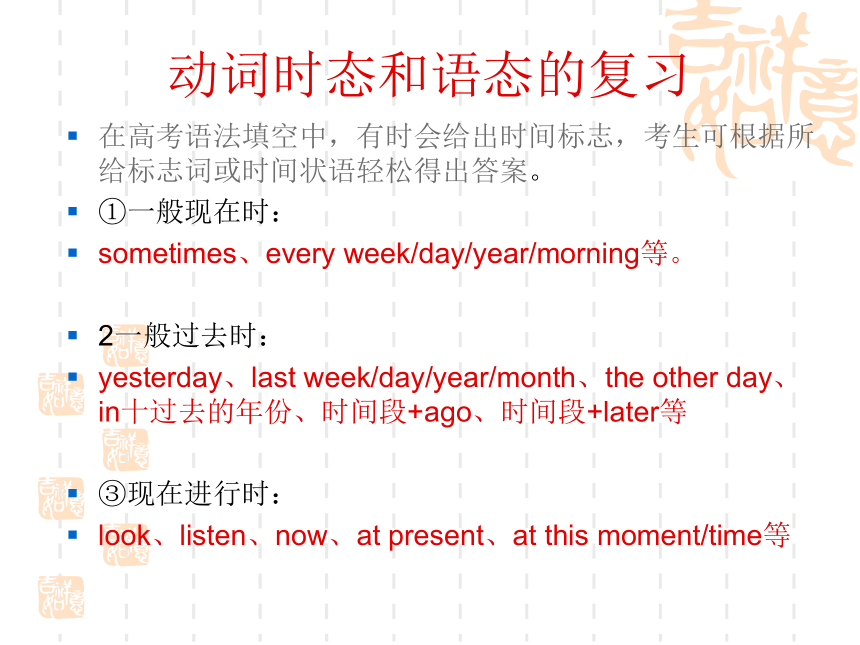 | |
| 格式 | zip | ||
| 文件大小 | 9.2MB | ||
| 资源类型 | 教案 | ||
| 版本资源 | 人教版(2019) | ||
| 科目 | 英语 | ||
| 更新时间 | 2021-05-08 15:02:00 | ||
图片预览

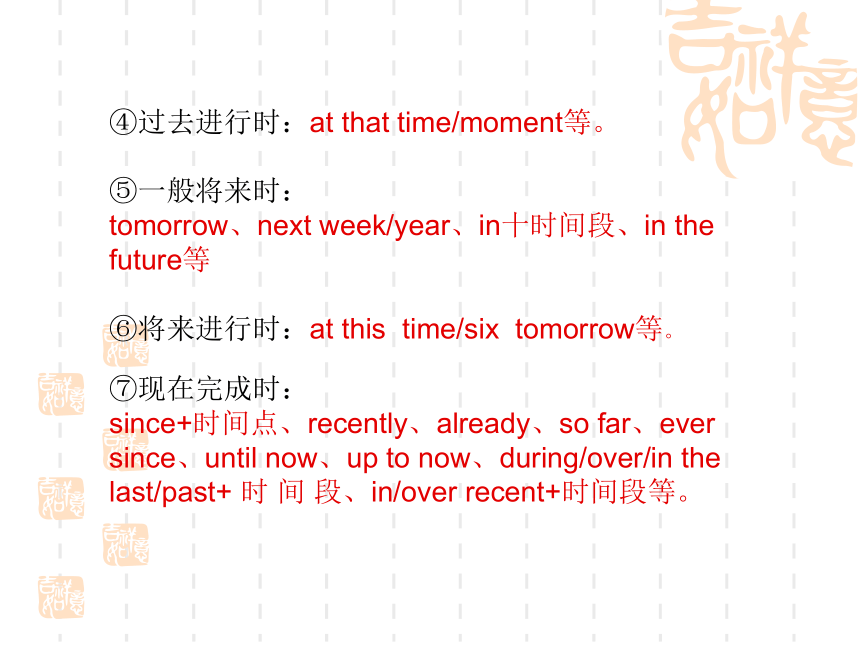

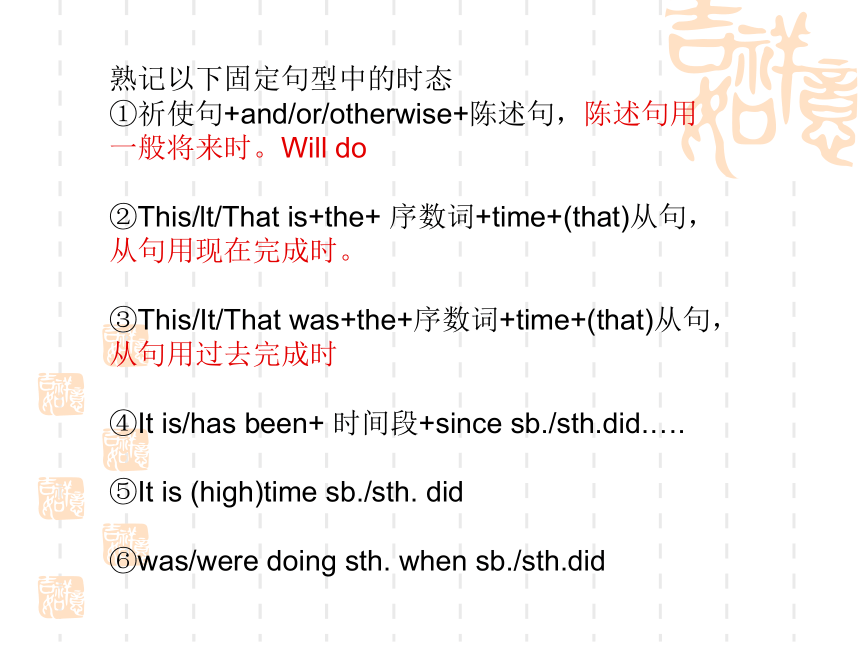
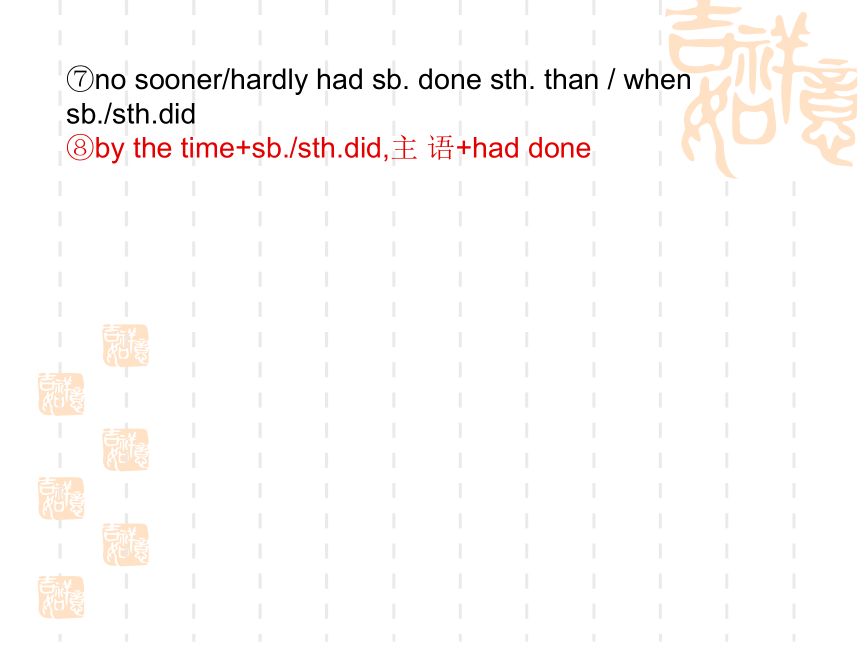
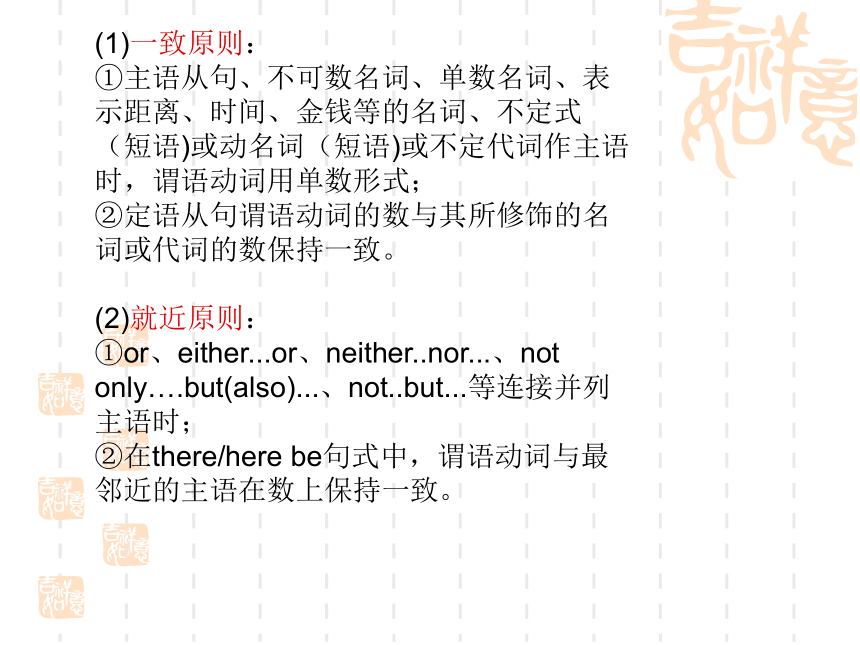
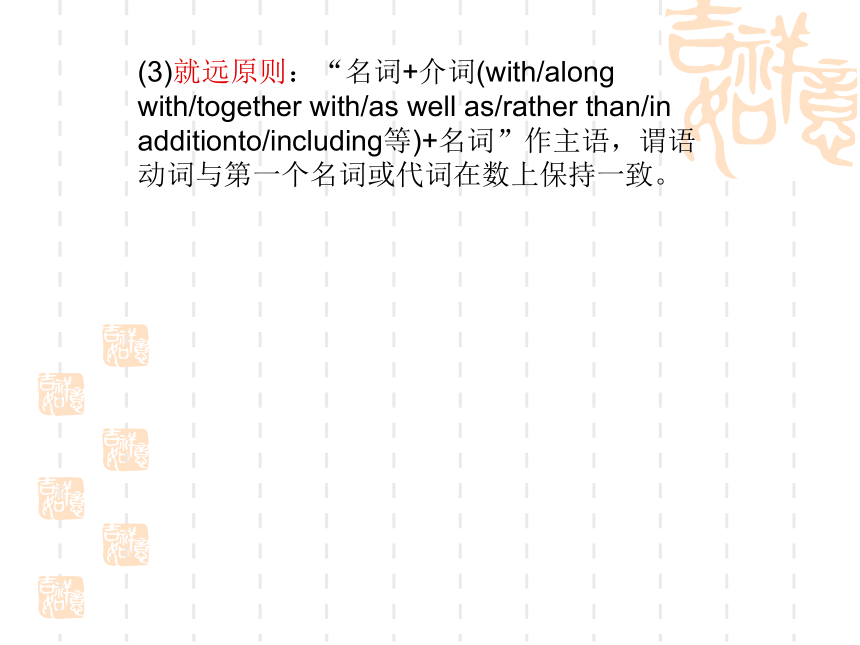
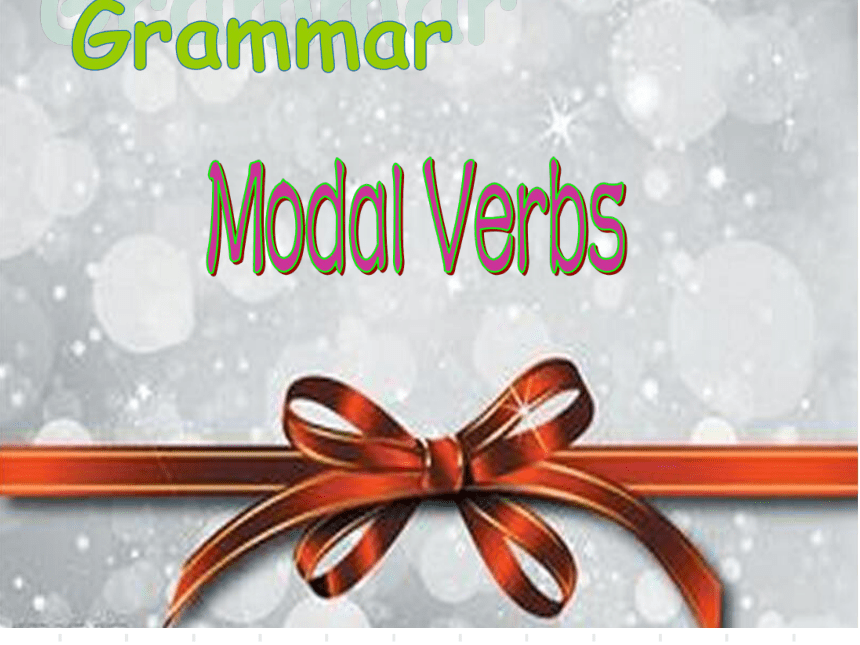


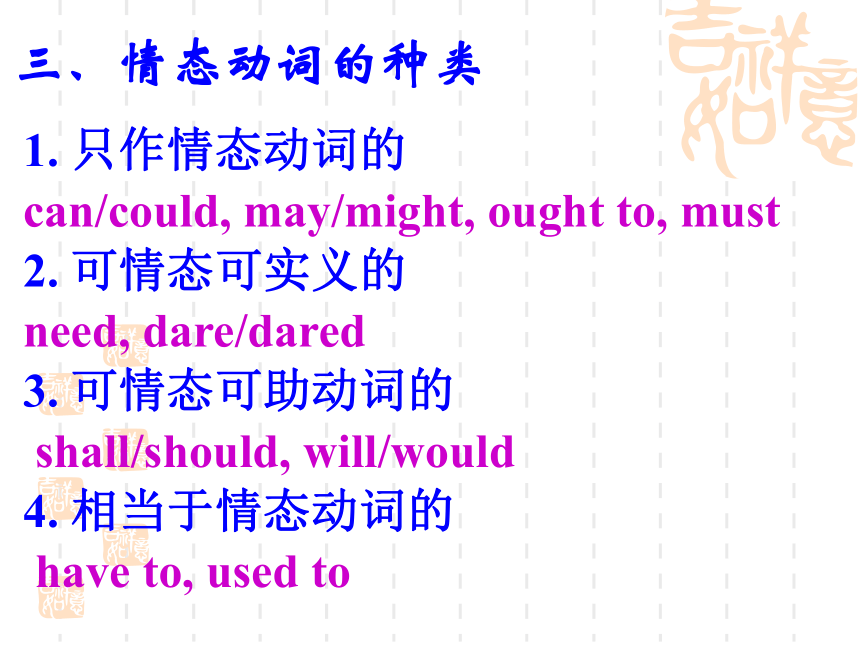
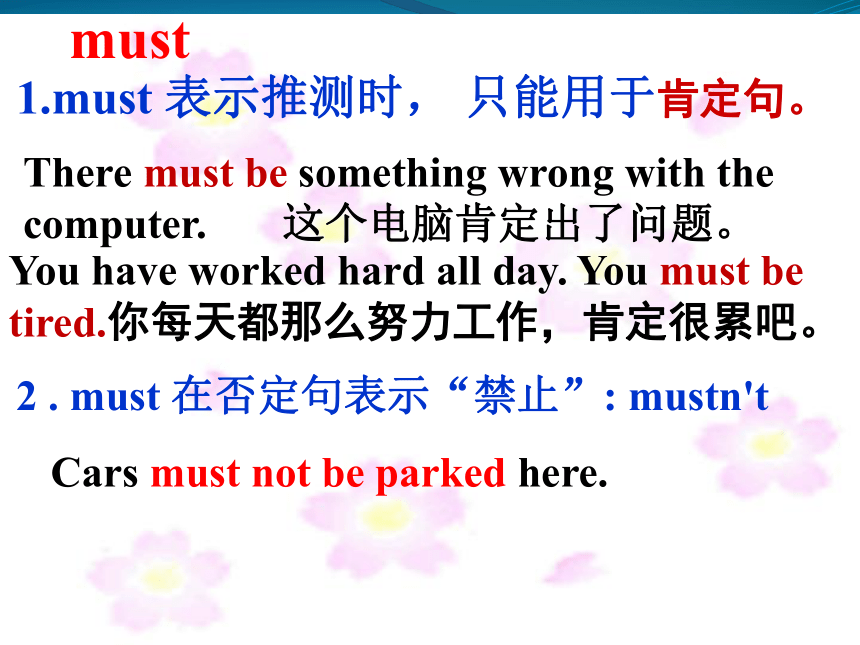
文档简介
(共30张PPT)
动词时态和语态的复习
在高考语法填空中,有时会给出时间标志,考生可根据所给标志词或时间状语轻松得出答案。
①一般现在时:
sometimes、every
week/day/year/morning等。
2一般过去时:
yesterday、last
week/day/year/month、the
other
day、in十过去的年份、时间段+ago、时间段+later等
③现在进行时:
look、listen、now、at
present、at
this
moment/time等
④过去进行时:at
that
time/moment等。
⑤一般将来时:
tomorrow、next
week/year、in十时间段、in
the
future等
⑥将来进行时:at
this
time/six
tomorrow等。
⑦现在完成时:
since+时间点、recently、already、so
far、ever
since、until
now、up
to
now、during/over/in
the
last/past+
时
间
段、in/over
recent+时间段等。
8过去完成时:
by
then、until
then、by/before/by
the
end
of+过去时间点等
(by
then
表示到……为止)
过去完成时常用句型:
realized/said
that
sb
had
done
熟记以下固定句型中的时态
①祈使句+and/or/otherwise+陈述句,陈述句用一般将来时。Will
do
②This/lt/That
is+the+
序数词+time+(that)从句,从句用现在完成时。
③This/It/That
was+the+序数词+time+(that)从句,从句用过去完成时
④It
is/has
been+
时间段+since
sb./sth.did.….
⑤It
is
(high)time
sb./sth.
did
⑥was/were
doing
sth.
when
sb./sth.did
⑦no
sooner/hardly
had
sb.
done
sth.
than
/
when
sb./sth.did
⑧by
the
time+sb./sth.did,主
语+had
done
(1)一致原则:
①主语从句、不可数名词、单数名词、表示距离、时间、金钱等的名词、不定式(短语)或动名词(短语)或不定代词作主语时,谓语动词用单数形式;
②定语从句谓语动词的数与其所修饰的名词或代词的数保持一致。
(2)就近原则:
①or、either...or、neither..nor...、not
only….but(also)...、not..but...等连接并列主语时;
②在there/here
be句式中,谓语动词与最邻近的主语在数上保持一致。
(3)就远原则:“名词+介词(with/along
with/together
with/as
well
as/rather
than/in
additionto/including等)+名词”作主语,谓语动词与第一个名词或代词在数上保持一致。
Grammar
Modal
Verbs
情态动词表示说话人的某种感情或语气,对某一动作、状态的态度。
表示“需要、可以、必须、应当”。
一、什么是情态动词?
二、情态动词的语法特征
1.
情态动词?不能单独做谓语,除ought
和have外,后面只能接不带to?的不定式。
2.
情态动词没有人称,数的变化,但有
些情态动词,如can,
will也有一般式
和过去式的变化。
1.
只作情态动词的
can/could,
may/might,
ought
to,
must
2.
可情态可实义的
need,
dare/dared
3.
可情态可助动词的
shall/should,
will/would
4.
相当于情态动词的
have
to,
used
to
三、情态动词的种类
must
1.must
表示推测时,
只能用于肯定句。
There
must
be
something
wrong
with
the
computer.
这个电脑肯定出了问题。
You
have
worked
hard
all
day.
You
must
be
tired.你每天都那么努力工作,肯定很累吧。
Cars
must
not
be
parked
here.
2
.
must
在否定句表示“禁止”:
mustn't
1.
表示能力:
?The
lecture
hall
can
seat
1000
people.
2.
?
表示推测,
用在否定句,“不可能”
He
can’t
be
at
home,
for
the
house
is
dark.
猜:Everyone
can
make
mistakes
in
his
life.
Accidents
can
happen
at
any
time.
4.
表示请求或允许:Can
I
sit
here?
can和could
3.在肯定句中,理论上的可能性
习惯搭配:
cannot
…too/enough
再…也不为过
I
can’t
thank
you
enough/too
much.
can’t
wait
to
do
sth
迫不及待做某事
can’t
(help)
but
do
sth
不得不做某事
can’t
help
doing
sth
禁不住做某事
could主要用法:
1.
could
是can的过去式,
We
all
knew
that
the
young
man
couldn’t
be
a
doctor.
B.
could可代替can表示请求,
语气较委婉:
I
would
appreciate
if
you
could….
1.
表示请求、允许:
??
May
I
come
in
?
You
may
go
now.
2.
表示推测,“可能”
---
I
believe
the
man
is
from
England.
---But
I
may
be
wrong
3.
表示祝愿
May
you
succeed!
may和might
固定搭配:
may/might
as
well
do
sth
不妨,最好
There
is
nothing
to
do,
so
I
may
as
well
go
to
bed.
will和would
1.
用于表示“意志”“决心”
I
will
offer
you
any
information
you
need.
2.
表示“请求”
Will
you
accept
my
invitation?
3.
表示“总是,习惯于”
He
will
take
a
walk
in
the
park
every
day.
4.
would与used
to
区别
He
used
to
live
in
the
country,
but
now
he
lives
in
the
city.
He
would
take
a
walk
after
supper
when
he
was
young.
used
to表示过去的事情,
现在不做
would
过去的习惯动作,与现在无关
shall,
should,
ought
to
1.
shall
用于第二、三人称肯定句,表示命令,警告,威胁
;
The
interest
shall
be
divided
into
five
parts,
according
to
the
agreement
made
by
both
sides.
2.
用于第一、三人称疑问句,表示征求对方意见或请求
What
shall
we
do
this
evening?
3.
Should
表示义务、建议,意为
“应该”。
You
should
keep
your
promise.
He
suggested
that
we
should
come
early.
4.
表示惊讶,不满,“竟然”
It
never
occurred
to
me
that
she
should
lie
to
me
again.
5.
表示推测“照说应该”.
He
should
be
20
years
old.
1.作为情态动词用,常用在否定句和疑问句中。
dare
(need)
do
sth
daren’t
(needn’t)
do
sth
I
daren’t
walk
through
the
forest
at
night.
Dare
you
walk
through
the
forest
at
night?
可做行为动词的情态动词:need
、
dare
2.
作实义动词用,常用在肯定句中,
有人称、时态、和数的变化:
在肯定句中,dare
后面常接带to
的不
定式。在疑问句和否定句中,dare可接带to或不带to的不定式
I
dare
to
swim
across
this
river.
He
doesn’t
dare
(to
)answer.
He
will
dare
any
danger.
I
dare
say----I
guess---
做行为动词的情态动词:need
、
dare
need(
want,
request)+
doing/
to
be
done
The
house
needs
cleaning/
to
be
cleaned
可兼做行为动词的情态动词:need
、
dare
主动形式表被动
summary
特征
种类
情态动词和虚拟语气是高考设题的冷点
主要考点:
(1)情态动词不能单独作谓语,需和后面的实义动词或be动词构成谓语:
情态动词+do/be;
表对过去的猜测时
用“情态动词+have
done”。
Practise
1.In
todays
information
age,
the
loss
of
data
____cause
serious
problems
for
a
company.
(can)
2.I
can't
find
my
purse.
I
might____(leave)
it
in
the
supermarket
yesterday,
but
I'm
not
sure.
(have
left)
3.They
might
have
found
a
better
hotel
if
they
____(drive)
a
few
more
kilometers.
(had
drove)
虚拟语气重要句型
①It's(high)time
that…did…;
would
rather
that
….did(与现在或将来相反)/had
done(与过去相反);
③wish
that
+….would/could
do(与将来事实相反);
wish
that+.….did/were(与现在事实相反);wish
that+.…
had
done(与过去事实
相反)。
动词时态和语态的复习
在高考语法填空中,有时会给出时间标志,考生可根据所给标志词或时间状语轻松得出答案。
①一般现在时:
sometimes、every
week/day/year/morning等。
2一般过去时:
yesterday、last
week/day/year/month、the
other
day、in十过去的年份、时间段+ago、时间段+later等
③现在进行时:
look、listen、now、at
present、at
this
moment/time等
④过去进行时:at
that
time/moment等。
⑤一般将来时:
tomorrow、next
week/year、in十时间段、in
the
future等
⑥将来进行时:at
this
time/six
tomorrow等。
⑦现在完成时:
since+时间点、recently、already、so
far、ever
since、until
now、up
to
now、during/over/in
the
last/past+
时
间
段、in/over
recent+时间段等。
8过去完成时:
by
then、until
then、by/before/by
the
end
of+过去时间点等
(by
then
表示到……为止)
过去完成时常用句型:
realized/said
that
sb
had
done
熟记以下固定句型中的时态
①祈使句+and/or/otherwise+陈述句,陈述句用一般将来时。Will
do
②This/lt/That
is+the+
序数词+time+(that)从句,从句用现在完成时。
③This/It/That
was+the+序数词+time+(that)从句,从句用过去完成时
④It
is/has
been+
时间段+since
sb./sth.did.….
⑤It
is
(high)time
sb./sth.
did
⑥was/were
doing
sth.
when
sb./sth.did
⑦no
sooner/hardly
had
sb.
done
sth.
than
/
when
sb./sth.did
⑧by
the
time+sb./sth.did,主
语+had
done
(1)一致原则:
①主语从句、不可数名词、单数名词、表示距离、时间、金钱等的名词、不定式(短语)或动名词(短语)或不定代词作主语时,谓语动词用单数形式;
②定语从句谓语动词的数与其所修饰的名词或代词的数保持一致。
(2)就近原则:
①or、either...or、neither..nor...、not
only….but(also)...、not..but...等连接并列主语时;
②在there/here
be句式中,谓语动词与最邻近的主语在数上保持一致。
(3)就远原则:“名词+介词(with/along
with/together
with/as
well
as/rather
than/in
additionto/including等)+名词”作主语,谓语动词与第一个名词或代词在数上保持一致。
Grammar
Modal
Verbs
情态动词表示说话人的某种感情或语气,对某一动作、状态的态度。
表示“需要、可以、必须、应当”。
一、什么是情态动词?
二、情态动词的语法特征
1.
情态动词?不能单独做谓语,除ought
和have外,后面只能接不带to?的不定式。
2.
情态动词没有人称,数的变化,但有
些情态动词,如can,
will也有一般式
和过去式的变化。
1.
只作情态动词的
can/could,
may/might,
ought
to,
must
2.
可情态可实义的
need,
dare/dared
3.
可情态可助动词的
shall/should,
will/would
4.
相当于情态动词的
have
to,
used
to
三、情态动词的种类
must
1.must
表示推测时,
只能用于肯定句。
There
must
be
something
wrong
with
the
computer.
这个电脑肯定出了问题。
You
have
worked
hard
all
day.
You
must
be
tired.你每天都那么努力工作,肯定很累吧。
Cars
must
not
be
parked
here.
2
.
must
在否定句表示“禁止”:
mustn't
1.
表示能力:
?The
lecture
hall
can
seat
1000
people.
2.
?
表示推测,
用在否定句,“不可能”
He
can’t
be
at
home,
for
the
house
is
dark.
猜:Everyone
can
make
mistakes
in
his
life.
Accidents
can
happen
at
any
time.
4.
表示请求或允许:Can
I
sit
here?
can和could
3.在肯定句中,理论上的可能性
习惯搭配:
cannot
…too/enough
再…也不为过
I
can’t
thank
you
enough/too
much.
can’t
wait
to
do
sth
迫不及待做某事
can’t
(help)
but
do
sth
不得不做某事
can’t
help
doing
sth
禁不住做某事
could主要用法:
1.
could
是can的过去式,
We
all
knew
that
the
young
man
couldn’t
be
a
doctor.
B.
could可代替can表示请求,
语气较委婉:
I
would
appreciate
if
you
could….
1.
表示请求、允许:
??
May
I
come
in
?
You
may
go
now.
2.
表示推测,“可能”
---
I
believe
the
man
is
from
England.
---But
I
may
be
wrong
3.
表示祝愿
May
you
succeed!
may和might
固定搭配:
may/might
as
well
do
sth
不妨,最好
There
is
nothing
to
do,
so
I
may
as
well
go
to
bed.
will和would
1.
用于表示“意志”“决心”
I
will
offer
you
any
information
you
need.
2.
表示“请求”
Will
you
accept
my
invitation?
3.
表示“总是,习惯于”
He
will
take
a
walk
in
the
park
every
day.
4.
would与used
to
区别
He
used
to
live
in
the
country,
but
now
he
lives
in
the
city.
He
would
take
a
walk
after
supper
when
he
was
young.
used
to表示过去的事情,
现在不做
would
过去的习惯动作,与现在无关
shall,
should,
ought
to
1.
shall
用于第二、三人称肯定句,表示命令,警告,威胁
;
The
interest
shall
be
divided
into
five
parts,
according
to
the
agreement
made
by
both
sides.
2.
用于第一、三人称疑问句,表示征求对方意见或请求
What
shall
we
do
this
evening?
3.
Should
表示义务、建议,意为
“应该”。
You
should
keep
your
promise.
He
suggested
that
we
should
come
early.
4.
表示惊讶,不满,“竟然”
It
never
occurred
to
me
that
she
should
lie
to
me
again.
5.
表示推测“照说应该”.
He
should
be
20
years
old.
1.作为情态动词用,常用在否定句和疑问句中。
dare
(need)
do
sth
daren’t
(needn’t)
do
sth
I
daren’t
walk
through
the
forest
at
night.
Dare
you
walk
through
the
forest
at
night?
可做行为动词的情态动词:need
、
dare
2.
作实义动词用,常用在肯定句中,
有人称、时态、和数的变化:
在肯定句中,dare
后面常接带to
的不
定式。在疑问句和否定句中,dare可接带to或不带to的不定式
I
dare
to
swim
across
this
river.
He
doesn’t
dare
(to
)answer.
He
will
dare
any
danger.
I
dare
say----I
guess---
做行为动词的情态动词:need
、
dare
need(
want,
request)+
doing/
to
be
done
The
house
needs
cleaning/
to
be
cleaned
可兼做行为动词的情态动词:need
、
dare
主动形式表被动
summary
特征
种类
情态动词和虚拟语气是高考设题的冷点
主要考点:
(1)情态动词不能单独作谓语,需和后面的实义动词或be动词构成谓语:
情态动词+do/be;
表对过去的猜测时
用“情态动词+have
done”。
Practise
1.In
todays
information
age,
the
loss
of
data
____cause
serious
problems
for
a
company.
(can)
2.I
can't
find
my
purse.
I
might____(leave)
it
in
the
supermarket
yesterday,
but
I'm
not
sure.
(have
left)
3.They
might
have
found
a
better
hotel
if
they
____(drive)
a
few
more
kilometers.
(had
drove)
虚拟语气重要句型
①It's(high)time
that…did…;
would
rather
that
….did(与现在或将来相反)/had
done(与过去相反);
③wish
that
+….would/could
do(与将来事实相反);
wish
that+.….did/were(与现在事实相反);wish
that+.…
had
done(与过去事实
相反)。
